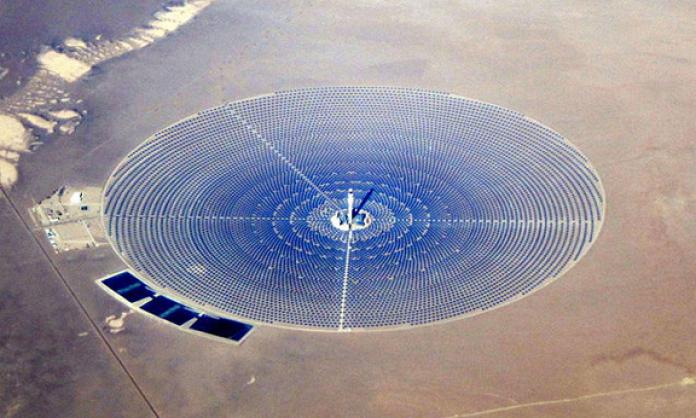It was a glimmer of light in the darkness. In 2017, plans for a giant solar thermal power plant in Port Augusta were announced.
In a state where job creation usually relies on the arms industry or oil drilling, Port Augusta was set to prove that investing in renewable energy generation could provide relief to depressed regional centres. Perhaps, some hoped, the project would also lead a challenge to Australia’s bleak fossil fuel landscape.
But SolarReserve, the US company tasked with constructing and operating the plant, has declared the project finished after failing to secure commercial finance. For the number crunchers, a solar thermal plant has been deemed not suitably profitable.
Meanwhile, the 650 jobs the plant was expected to generate have evaporated. Workers have once again been thrown away like scrap metal. “The whole concept, with the amazing solar technology and just the sheer size of it, and the employment it would have put into the town, meant there were high hopes for it to go ahead”, Port Augusta resident, Jim Furnell, told Red Flag.
“It looked all ready to go. Everybody thought it was going to happen, right up to the day when they just said ‘no’. All the utilities should have been left in government hands. They’ve got an opportunity now, with renewable technology, to take control over the power.”
The major parties, however, will not take such an opportunity. The Labor Party puts all blame on the state Liberal government for the failure. But Labor announced the plan when it was last in office, and Labor decided it would be run for profit by SolarReserve.
Promoters of “green capitalism” should take heed. A transition to renewables cannot be subject to the whims of the market.
The solar thermal project should immediately be taken into public hands. The plant should be built and run to benefit the environment, workers in Port Augusta and the public as a whole, not for companies or banks. Any larger scale transition to renewals will require this sort of political will and commitment to thoroughgoing change in defiance of corporate interests.
The project’s apparent collapse is not only a setback for the environment. It is also a kick in the guts for working class people.
The “Iron Triangle” – South Australia’s once powerful iron-producing network of Port Augusta, Port Pirie and Whyalla – has faced long term decline. The 2016 census recorded Port Augusta’s unemployment rate at 9.7 percent, well above the national rate of 6.9 percent.
In the same year, Port Augusta’s large coal-fired power station was closed, leaving hundreds jobless. Its giant chimney stack crashed to the ground last November, marking the end of the demolition process.
“There’s general disappointment in the town”, Jim says. “It’s been three years [since the coal-fired plant shut down]. That’s a long time.” He expects more frustration: “Some investment in new infrastructure in the town will probably come to a halt” due to SolarReserve’s announcement.
“Port Augusta gets a bit of a bad rap, so there’s a lot of disappointment.”








